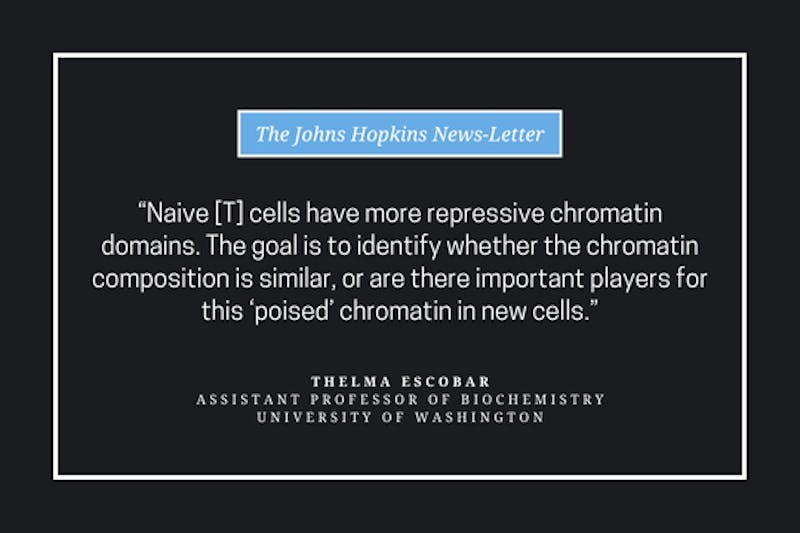Science
Thelma Escobar Reveals Insights on Epigenetics and Cancer at Seminar

Thelma Escobar, an assistant professor of biochemistry at the University of Washington, delivered a compelling presentation on September 25, 2025, during the Hopkins Department of Biology’s Seminar Series. Her research focuses on epigenetic modifications in hematopoietic stem cells (HSCs) and their implications for cancer, particularly acute myeloid leukemia (AML).
Understanding Hematopoietic Stem Cells and Epigenetics
Hematopoietic stem cells are essential for producing blood and immune cells, residing primarily in the bone marrow. Escobar emphasized that the maintenance of HSC identity and their differentiation into various cell types are tightly regulated processes influenced by epigenetic factors. This includes histone modifications that significantly affect gene expression.
Within the nucleus of a cell, DNA is negatively charged and wrapped around positively charged histones. The interaction between these components determines whether genes are expressed. Regions known as euchromatin allow for increased expression due to looser associations, while heterochromatin remains tightly bound, inhibiting transcription. Escobar explained that a “poised” chromatin state exists, characterized by both repressive and activating histone modifications.
As cells divide, the replication of negatively charged DNA requires an equal increase in histones to maintain balance. “This process involves a very complex orchestration of destruction of parental histones and recycling of histones, as well as de novo deposition, all occurring during DNA replication,” Escobar noted.
Investigating Nucleophosmin 1 and Acute Myeloid Leukemia
Escobar’s lab focuses on histone chaperone proteins, specifically Nucleophosmin 1 (NPM1), which she studied during her postdoctoral research. This protein is linked to AML, a severe blood cancer that originates in the bone marrow. “NPM1 mutations are shown to be present in 30 to 35% of all AMLs,” Escobar stated, highlighting the need for targeted therapies for this mutation.
Escobar’s current hypothesis posits that mutated NPM1 enhances the activity of HOX genes, which could lead to increased cell proliferation and reduced differentiation in HSCs. If this mutation occurs in the bone marrow, HSCs may overproliferate, compromising their ability to serve as blood-cell precursors.
To explore this, her lab has differentiated induced pluripotent stem cells (iPSCs) into HSCs, enabling them to generate sufficient quantities for experimentation. One ongoing project compares the interactions of NPM1 with its mutated counterpart, revealing significant discoveries.
A notable finding indicates that NPM1 interacts with another protein often mutated in pre-AML stages. Additionally, Escobar’s team identified a fragment of NPM1 within the nuclei of HSCs, a phenomenon not typically observed in other cell types. By mutating various sites on the NPM1 protein, they pinpointed a five-amino-acid sequence crucial for cleavage, which may explain the presence of this fragment.
Escobar plans to further investigate the implications of this NPM1 fragment on cellular and physiological processes, promising to uncover more about its role in HSCs and AML.
Exploring Chromatin Changes in the Immune System
In addition to her work on NPM1, Escobar briefly discussed research on chromatin modifications in T cells, which are vital components of the adaptive immune system. Prior studies have primarily concentrated on how B and T cells proliferate rapidly upon pathogen re-exposure. However, Escobar’s lab aims to understand the role of chromatin states and epigenetics in this context.
“Naive T cells have more repressive chromatin domains,” she explained, indicating that her research strives to identify whether chromatin composition is similar across different cell types or if unique factors play a role in poised chromatin states. She suggested that immune cells with poised chromatin might activate more rapidly during reinfection due to the presence of activating histone modifications.
In conclusion, Escobar’s presentation showcased her lab’s innovative approach to studying the epigenetic underpinnings of hematopoietic stem cells and their connections to cancer. She expressed enthusiasm for future projects, urging the audience to stay tuned for updates. “We’re mixing biochemistry and hematopoietic stem cell differentiation. Hopefully, we can share our findings soon,” she said.
-

 Technology4 months ago
Technology4 months agoDiscover the Top 10 Calorie Counting Apps of 2025
-

 Health2 months ago
Health2 months agoBella Hadid Shares Health Update After Treatment for Lyme Disease
-

 Health3 months ago
Health3 months agoErin Bates Shares Recovery Update Following Sepsis Complications
-

 Technology4 weeks ago
Technology4 weeks agoDiscover 2025’s Top GPUs for Exceptional 4K Gaming Performance
-

 Technology2 months ago
Technology2 months agoElectric Moto Influencer Surronster Arrested in Tijuana
-

 Technology4 months ago
Technology4 months agoDiscover How to Reverse Image Search Using ChatGPT Effortlessly
-

 Technology5 months ago
Technology5 months agoMeta Initiates $60B AI Data Center Expansion, Starting in Ohio
-

 Technology4 months ago
Technology4 months agoRecovering a Suspended TikTok Account: A Step-by-Step Guide
-

 Health4 months ago
Health4 months agoTested: Rab Firewall Mountain Jacket Survives Harsh Conditions
-

 Lifestyle4 months ago
Lifestyle4 months agoBelton Family Reunites After Daughter Survives Hill Country Floods
-

 Technology3 months ago
Technology3 months agoUncovering the Top Five Most Challenging Motorcycles to Ride
-

 Technology4 months ago
Technology4 months agoHarmonic Launches AI Chatbot App to Transform Mathematical Reasoning





















